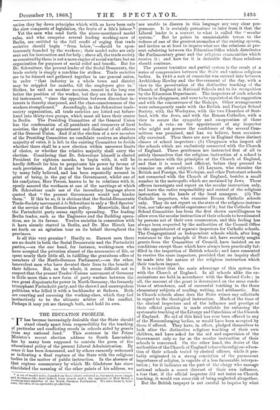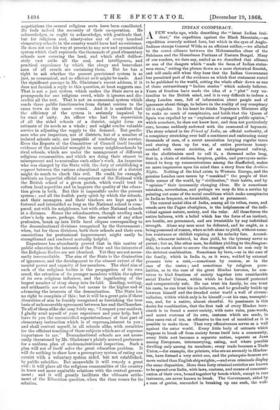THE EDUCATION PROBLEM.
" TT has become increasingly desirable that the State should
IL stand clearly apart from responsibility for the teaching of particular and conflicting creeds in schools aided by grants from any national fund." This sentence in the Prime Minister's recent election address to South Lancashire has by many been supposed to contain the germ of the educational policy of the present Liberal Administration. By some it has been denounced, and by others earnestly welcomed as indicating a final rupture of the State with the religious bodies in the matter of public instruction. In the absence of that copious commentary by which Mr. Gladstone has since elucidated the meaning of the other points of his address, we
• A set of model rules, founded on those above referred to, but much more simple and workman-like, have indeed been issued under the signature of Herr Hebei, a working-man member of the North German Parliament. We miss from it, how- ever, the idea of co-operative production.
are unable to discern in this language any very clear pro- gramme. It is certainly premature to infer from it that the Liberal leader is a convert to what is called the "secular system." But he points in unmistakable terms to the redress of one of the greatest anomalies of the existing system, and invites us at least to inquire what are the relations at pre- sent subsisting between the Education Office which distributes the Parliamentary grant and the religious communities which receive it. ; and how far it is desirable that those relations should continue.
The present tentative and partial system is the result of a series of compromises between the State and various religious bodies. In 1840 a sort of concordat was entered into between Archbishop Howley and the Government of the day, with a view to the preservation of the distinctive teaching of the Church of England in National Schools and to its recognition by the Education Department. The inspectors of such school* were to be clergymen, and were to be appointed at the suggestion and with the concurrence of the Bishops. Other arrangements were subsequently made with the British and Foreign School Society, with the Wesleyans, with the two Churches of Scot- land, with the Jews, and with the Roman Catholics, with a view to secure the sympathy and co-operation of those bodies. A veto, on the appointment of any inspector who might not possess the confidence of the several Com- mittees was promised, and has, we believe, been occasion- ally exercised. Thus there are now in England three distinct classes of school inspectors : (1) Clergymen who inspect all the schools which are exclusively connected with the Church of England. These gentlemen are instructed first of all to satisfy themselves that the religious instruction of a school is in accordance with the principles of the Church of England, and that it is sound and efficient, before they proceed to examine on other subjects. (2) Laymen, who examine the British and Foreign, the Wesleyan, and other Protestant schools not connected with the Church of England, besides a small number in the metropolis which are sustained by Jews. These officers investigate and report on the secular instruction only, and leave the entire responsibility and control of the religions- instruction in the hands of the local managers. (3) The Catholic inspectors, who examine Roman Catholic schools only. They do not report on the state of the religious instruc- tion, nor take any official cognizance of it; but the Catholic Poor School Committee has from the first shown unwillingness to allow even the secular instruction of their schools to be estimated by persons not of their own communion, and this feeling has
always been respected by the authorities of the Council Office in the appointment of separate inspectors for Catholic schools.
The Congregational or Independent schools which, after long resistance to the principle of State aid, have recently sought grants from the Committee of Council, have insisted on no conditions except those which have always been practically ful- filled in the inspection of British schools ; and have consented to receive the same inspectors, provided that no inquiry shall be made into the nature of the religious instruction which their teachers impart.
It is evident that the main advantage of this system lies with the Church of England. In all schools alike the ex- aminations are held in accordance with the Revised Code ; in all, the amount of the grant is determined on the same condi- tions of attendance, and of successful teaching in the three elementary subjects of reading, writing, and arithmetic. But in Church schools alone does the State evince any solicitude in regard to the theological instruction. Much of the time of the clerical inspectors and of the influence and prestige of their official position is made available for enforcing the systematic teaching of the Liturgy and Catechism of the Church of England. No aid of this kind has ever been offered to any
of the Nonconforving bodies, or would have been accepted by
them if offered. They have, in effect, pledged themselves to look after the distinctive religions teaching of their own children, and have asked for the aid and supervision of the Government only so far as the secular instruction of their schools is concerned. On the other hand, the desire of the authorities of the Church of England to have the religious educa- tion of their schools tested by clerical officers, while it pro- bably originated in a strong conviction of the paramount importance of religion, is capable of a less favourable interpre- tation; for it indicates on the part of the clergy who manage national schools a secret distrust of their own influence, a fear that, if the official inspector did not insist on Church teaching, it would run some risk of being neglected altogether. But the British taxpayer is not careful to inquire by what negotiations the several religious sects have been conciliated. He feels indeed the necessity of their co-operation. He acknowledges, or ought to acknowledge, with gratitude that, but for religious zeal, ninety-nine out of every hundred elementary schools in the country would have had no existence. He does not see his way at present to any new and symmetrical system which shall supersede the thousands of good elementary schools now covering the land, and which shall deliber- ately cast aside all the zeal, and intelligence, and practical experience by which the clergy and benevolent men of all creeds are sustaining them. But he has a right to ask whether the present provisional system is as just, as economical, and as efficient as it might be made. And the significant passage in Mr. Gladstone's recent address, if it does not furnish a reply to this question, at least suggests one. That is not a just system which makes the State serve as a propaganda for one religious creed, while it ignores and dis- credits all the rest. That is not an economical system which sends three public functionaries from distant centres to the same town on the same errand. And it is manifest that the efficiency of the system is seriously impaired by its want of unity. An officer who had the supervision of all the aided schools of a district, might form an estimate of its needs as a whole ; and might render valuable service in adjusting the supply to the demand. But gentle- men who are inspectors, not of districts, but of a number of isolated schools only, are incapable of rendering this service. Even the Reports of the Committee of Council itself furnish evidence of the mischief wrought in many neighbourhoods by rival schools, which are under the management of different religious communities, and which are doing their utmost to misrepresent and to neutralize each other's work. An inspector who was charged by the State with the duty of establishing a rapport between the various educational agencies of a district might do much to check this evil. He could, for example, institute an impartial official comparison of the National with the British school of a given parish, which would tend to soften local asperities and to improve the quality of the educa- tion given in both. But this is impossible under the present system ; and all the foolish party spirit by which the schools, and their managers, and their teachers are kept apart is fostered and intensified so long as the National school is com- pared, not with its neighbours, but with other National schools at a distance. Hence the schoolmasters, though needing each other's help more, perhaps, than the members of any other profession, break up into little local cliques corresponding to the denominational divisions recognized by the Government ; when, but for these divisions, both their schools and their own associations for professional improvement might easily be strengthened and rendered mutually helpful.
Experience has abundantly proved that in this matter of public education the interests of the State and the interests of the Religious Bodies are not identical. Yet they are not neces- sarily irreconcilable. The aim of the State is the diminution of ignorance, and the development to the utmost extent of the mental power and capacity of her members. The chief aim of each of the religious bodies is the propagation of its own creed, the retention of its younger members within the sphere of its own religious influence, and the ingathering of the largest number of stray sheep into its fold. Reading, writing, and arithmetic are not ends, but means to the higher end of advancing the interests of the denomination. The State has no right to complain of this ; but it will be a great gain if these diversities of aim be frankly recognized as furnishing the true basis of anhonourable agreement between her and the Churches. To all of them alike she may fairly say, "I respect your motives, I gladly avail myself of your experience and your help, but I leave to you the uncontrolled superintendence of that part of elementary instruction which is of supremeanterest to you ; and shall content myself, in all schools alike, with securities for the efficient teaching of those subjects which are of supreme importance to me." Denominational schools are not neces- sarily threatened by Mr. Gladstone's plainly avowed preference for a uniform plan of undenominational inspection. Such a plan will not of itself solve the great education problem. It will do nothing to show how a peremptory system of rating can coexist with a voluntary system aided, but not established, by public subsidies. But meanwhile it will remedy a great evil ; it will place all the religious communities of the country in truer and more equitable relations with the central govern- ment; and it will greatly facilitate the ultimate settle- ment of the Education question, when the time comes for its solution.







































 Previous page
Previous page